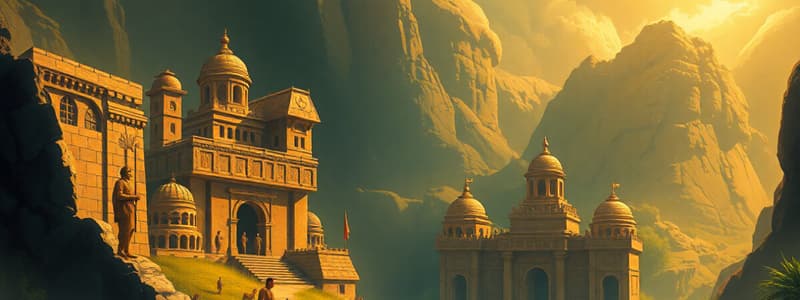Podcast
Questions and Answers
The emergence of nation-states was a minor factor in the development of modern political entities.
The emergence of nation-states was a minor factor in the development of modern political entities.
False (B)
Industrialization contributed to dramatic changes in social structures during the Modern Period.
Industrialization contributed to dramatic changes in social structures during the Modern Period.
True (A)
The printing press had no impact on communication and societal structures during the early modern period.
The printing press had no impact on communication and societal structures during the early modern period.
False (B)
Global interconnectedness has decreased over time, leading to more isolated nations.
Global interconnectedness has decreased over time, leading to more isolated nations.
The Scientific Revolution reinforced traditional beliefs rather than challenging them.
The Scientific Revolution reinforced traditional beliefs rather than challenging them.
The first hominids emerged millions of years ago, marking the beginning of human history.
The first hominids emerged millions of years ago, marking the beginning of human history.
The Indus Valley civilization was characterized mainly by its focus on military expansion and conquest.
The Indus Valley civilization was characterized mainly by its focus on military expansion and conquest.
Greek philosophy had a negligible effect on Western thought during the Classical Era.
Greek philosophy had a negligible effect on Western thought during the Classical Era.
The Medieval period was marked by the solidification of political structures and the absence of feudalism.
The Medieval period was marked by the solidification of political structures and the absence of feudalism.
Humanism during the Renaissance focused on human potential and accomplishments.
Humanism during the Renaissance focused on human potential and accomplishments.
Monumental architecture like pyramids and ziggurats was a feature of early Greek civilizations.
Monumental architecture like pyramids and ziggurats was a feature of early Greek civilizations.
The Crusades were a period of peaceful exchanges between Europe and the Middle East.
The Crusades were a period of peaceful exchanges between Europe and the Middle East.
During the Renaissance, exploration and trade expanded Europe's global reach.
During the Renaissance, exploration and trade expanded Europe's global reach.
Flashcards
Early Modern Period
Early Modern Period
A period of significant change in Europe marked by the rise of secularism, new art and science, and the influence of the printing press.
Modern Period
Modern Period
A period of dramatic social and political transformation characterized by the rise of nation-states, industrialization, colonialism, and world wars.
Mercantilism
Mercantilism
An economic theory emphasizing state control over trade and economic wealth, often tied to colonization and the acquisition of resources.
Scientific Revolution
Scientific Revolution
Signup and view all the flashcards
Contemporary History
Contemporary History
Signup and view all the flashcards
Early Human Societies
Early Human Societies
Signup and view all the flashcards
Ancient Civilizations
Ancient Civilizations
Signup and view all the flashcards
Classical Era
Classical Era
Signup and view all the flashcards
Medieval Period
Medieval Period
Signup and view all the flashcards
Renaissance
Renaissance
Signup and view all the flashcards
Migration
Migration
Signup and view all the flashcards
Tool Development
Tool Development
Signup and view all the flashcards
Writing Systems
Writing Systems
Signup and view all the flashcards
Study Notes
Early History
- Human history spans millions of years, beginning with the emergence of the first hominids.
- Early societies developed through interactions with their environments.
- Early human life centered around gathering, hunting, and animal domestication.
- Migration was common, driving societal adaptation.
- Tools and technologies shaped social structures significantly.
Ancient Civilizations
- Ancient civilizations like Mesopotamia, Egypt, and the Indus Valley had early, complex political systems.
- Advanced agriculture, irrigation, and social structures were key features.
- Religion played a crucial role in daily life and governance.
- Writing systems developed, enabling record-keeping and knowledge dissemination.
- Trade fostered cultural exchange and innovation.
- Monumental architecture like pyramids and ziggurats symbolized societal values and power.
Classical Era
- The Classical Era saw the rise of Greek city-states and the Roman Empire.
- Greek philosophy, emphasizing democracy, reason, and logic, influenced Western thought.
- Roman military strength and administration shaped European politics.
- Innovations in law, engineering, and governance were prominent.
- The spread of Christianity significantly impacted culture and religion.
Medieval Period
- The Medieval period followed the fall of the Western Roman Empire and witnessed the rise of feudalism.
- The Catholic Church held substantial social and intellectual power.
- European societies experienced changes including political fragmentation, technological advancements, and intellectual growth.
- Feudal systems emphasized obligations, loyalty, and reciprocity.
- The Crusades were a pivotal point of contact and conflict between Europe and the Middle East.
Renaissance
- The Renaissance, a "rebirth," brought cultural and intellectual flourishing.
- Humanism emphasized human potential and achievements.
- Innovations in art, literature, and science occurred.
- Exploration and trade expanded European influence globally.
- Secular views fostered new artistic and scientific approaches.
Early Modern Period
- European colonization significantly impacted the world.
- Mercantilism shaped international economic relations.
- The Scientific Revolution challenged traditional beliefs and promoted knowledge.
- Innovations like the printing press influenced communication and societal structures.
Modern Period
- Nation-states became dominant political forces.
- Industrialization, urbanization, and social reforms drastically altered societies.
- Colonial empires rose and fell.
- World wars profoundly reshaped the political and economic landscape.
- Global interconnectedness increased, creating interdependence.
Contemporary History
- Global interdependence and technological advancements define the contemporary world.
- International organizations and alliances hold importance.
- Social and political issues remain central.
- Global economic systems and trends are important factors for society.
- Communication networks and technology fundamentally reshape global interactions.
Studying That Suits You
Use AI to generate personalized quizzes and flashcards to suit your learning preferences.




